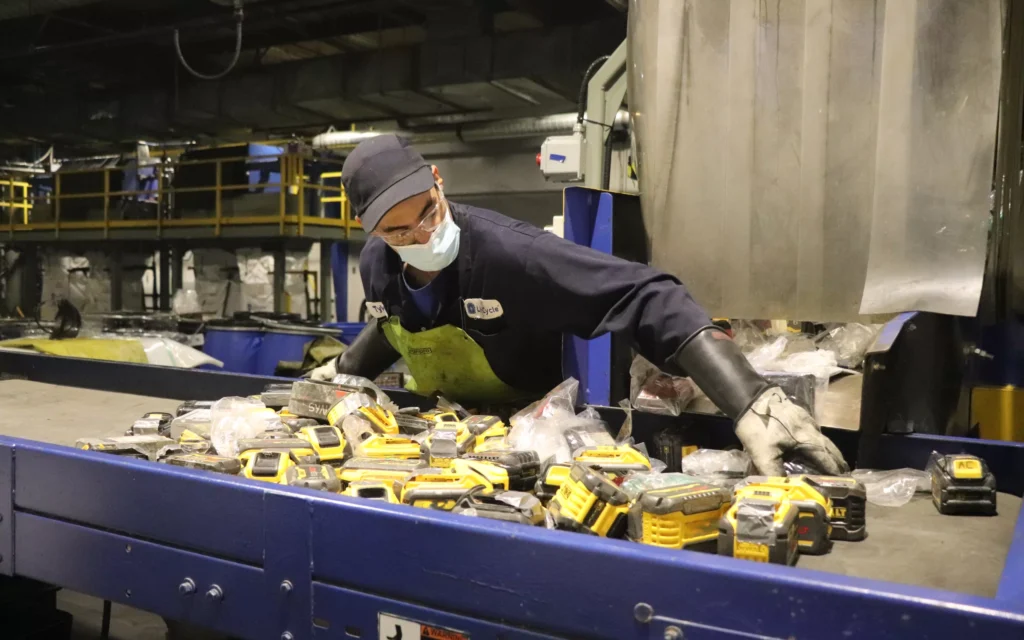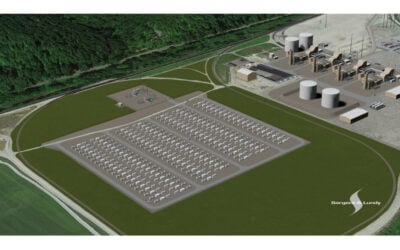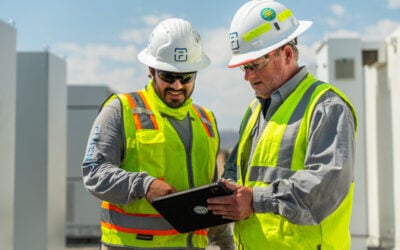
Li-Cycle is exploring “strategic alternatives” after pausing work on its main recycling facility in New York following soaring project costs while industry peer Aqua Metals claims to Energy-Storage.news that its facility is 60% cheaper to build.
The recycling and end-of-life question for BESS
Though most volumes for recyclers come from the EV space, the question of what to do with end-of-life batteries will become increasingly important for the battery energy storage system (BESS) sector as systems age.
Enjoy 12 months of exclusive analysis
- Regular insight and analysis of the industry’s biggest developments
- In-depth interviews with the industry’s leading figures
- Annual digital subscription to the PV Tech Power journal
- Discounts on Solar Media’s portfolio of events, in-person and virtual
Recycling will likely be a huge part of that and so the prospects of that industry – within which Li-Cycle is arguably the most visible representation in the US – should be on the radar of anyone with a long-term view of the BESS market.
Li-Cycle pauses construction, reduces workforce
Li-Cycle was listed on the NYSE in August 2021 via a special purpose acquisition company (SPAC) transaction, raising US$615 million and valuing it at US$1.67 billion, which was quickly followed by US$100 million and US$200 million convertible note investments from Koch Industries and Glencore, respectively. Then in February this year, it got a US$375 million loan commitment from the Department of Energy’s (DOE) Loan Programs Office.
The firm has been building ‘spoke’ facilities across the US which are turning end-of-life lithium-ion batteries and battery scrap into black mass, to be eventually sent to a new ‘hub’ in Rochester which would use hydrometallurgical processes to separate it into the critical metals needed for battery production, namely lithium, nickel and cobalt.
While many point to the need to place more emphasis on re-use or re-deployment rather than recycling, the US government has given the sector big backing as part of efforts to kickstart a domestic battery supply chain. The DOE/LPO have also provided a US$2 billion loan to Redwood Materials, US$480 million in grants to Ascend Elements and recently announced US$192 million for a range of battery recycling projects.
However, the outlook around Li-Cycle has changed significantly in the past few months. On 23 October it announced a pause in construction of its Rochester hub, which was meant to start operations before the end of the year, citing ‘escalating construction costs’.
Specifically, subcontractor agreements for things like mechanical equipment, structural steel, electrical, instrumentation for measurement and process control devices came in higher than expected, exacerbated by a major ramp-up in other construction projects around the same time.
In its Q3 results on 13 November, it revealed those projected costs had increased to between US$850 million to US$1 billion from US$560 million in previous forecasts, and that it was writing down its non-cash assets by US$95 million relating to this. It has already spent US$301 million of that budget and has US$100 million cash left overall. It is also reducing activity at its spoke locations.
On the same day, the firm announced it had appointed investment bank Moelis & Company to “evaluate financing and strategic alternatives”, later saying it had started a “robust process that includes both existing stakeholders and potential new investors”. Glencore put out its own statement in response saying that if it converted its convertible note into equity it would hold 11.27% of Li-Cycle’s shares.
Li-Cycle’s share price is down 86% from a year ago, sitting at US$0.79, equating to a market capitalisation of around US$140 million. It has said it won’t comment further on the process and will only make announcements in accordance with disclosure obligations.
As with many other SPAC-listed companies in the energy storage space, Li-Cycle is now also subject to various class action lawsuits for allegedly misleading investors.
Aqua Metals
Aqua Metals is another company looking to scale up lithium-ion battery recycling but is doing so at a much smaller scale financially and with a proprietary recycling technology, which the firm discussed in a Q&A with Energy-Storage.news.
The firm is also publicly listed after a US$33 million IPO back in 2015 to which it added a US$20 million placement in July 2023. Despite clearly being dwarfed by Li-Cycle’s financial clout, its market cap is two-thirds of Li-Cycles at around US$90 million at the time of writing (though Aqua Metals’ share price hasn’t performed well this year either, being half where it was six months ago).
A spokesperson for the company explained that Aqua Metals’ process uses electrons as sustainable reagents via electroplating to extract the valuable metals from black mass using electricity. The cost and carbon footprint of its process therefore all comes down to the electricity it procures.
Standard hydrometallurgy meanwhile is chemical-intensive, leveraging a series of chemical reactions and pH adjustments to separate valuable metals, with each step consuming chemicals and producing a byproduct that must be treated, stored, and ultimately shipped to landfill, they added.
The cost to build its first commercial-scale facility is also substantially lower than for hydrometallurgy, based on Li-Cycle’s recent revelations, although Aqua Metals added the caveat that it is “difficult to compare apples-to-apples for operating costs”.
Li-Cycle’s projected potential US$1 billion cost for its 35,000 tonnes/year facility equates to US$28,000 per tonne of capacity, they say, whereas Aqua Metals’ 10,000 tonnes/year facility will only cost US$100 million, or US$10,000 per tonne of capacity – a 60% lower upfront cost.
“It is difficult to compare apples-to-apples for operating costs, as only a couple of recyclers are operational at meaningful scale in North America,” they add.
“There are no commercial hydrometallurgical facilities producing battery grade products in the Western hemisphere today. The operating costs of AquaRefining are projected to be much lower because chemical supply and storage costs are minimized and replaced with stable and predictable utility electricity pricing. These cost savings translate directly into margin for each tonne of material recycled using AquaRefining.”
Energy-Storage.news will be publishing the full Q&A with Aqua Metals later this week, in which it discusses the cost and technology angle as well as its view of the ESS market and how it plans to mitigate against the volatile prices of the critical battery metals which will determine its long-term revenue.






